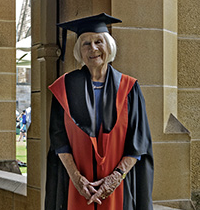Elizabeth Kirby, OAM, is Australia’s oldest university graduate. At 85, after a successful career as an actor, radio broadcaster, politician, and farmer, she started undergraduate studies. In 2014, aged 93, she graduated with a PhD examining the social justice impacts of the global financial crisis. What an achievement!
Mother of three, grandmother of four and great grandmother of one, Elizabeth advises
When you do get to retirement, have a holiday by all means, relax, but then find something interesting to do, something you’ve always wanted to do and maybe never have the opportunity because too many other things happened in your life.
What should we take away from that lovely story?
A study on preventing dementia tells us that “older adults who take college courses may increase their cognitive capacity and possibly reduce their risk for developing Alzheimer’s disease or other forms of dementia.” In a four year period about 360 participants aged between 50-79 were tested. Over 90% of those who did some sort of university study in that period displayed a significant increase in cognitive reserve.
What is cognitive reserve?
Dementia experts use this term to describe a person’s capacity to “utilize preexisting brain networks efficiently (neural reserve) as well as to enlist alternate brain networks (neural compensation) when under the duress of brain pathology” Lenehan et al 2016, p. 525.
In everyday language, it means that people with dementia have brains that are affected by amyloid plaques and the neurofibrillary tangles that cause brain shrinkage (pathology). Even though this change impacts on a person’s capacity to function, a person with higher “cognitive reserve” is more able to retain brain function than others. In other words, although some people have a high presence of Alzheimer’s pathology, they aren’t demonstrating the usual symptoms of the illness. In comparison “other people can have just a small level of damage to their brain, yet they start showing these deficits on a day-to-day basis, and they have more difficulty with memory function and planning”.*
This is still only a theory as the experts are not able to measure brain pathology of persons until they are dead. But it does explain why those with a higher level of education or occupations that are complex and demanding are at lower risk of developing Alzheimer’s Disease. Scientists think that people with high cognitive reserve have more resilience and adaptability and are able to compensate for the disease by switching neural networks (a collection of brain neurons and synapses that need to work together) to perform tasks when the original network is damaged.
So how can we build cognitive reserve?
You have more cognitive reserve because you have a good memory and can function, and if you can’t remember things, you have lower cognitive reserve, and none of us can be sure as to the extent, if any, of actual brain disease until we are dead!
In any case, there’s no harm following the suggestion of dementia experts to take up prolonged engagement with mentally challenging activities. Learning new things, for example, taking up playing bridge, learning a new language or a musical instrument can build cognitive reserve. The key is not only that we are mentally challenged, but that the challenge must be regular and frequent over a period of time.
We all know that to stick to any activity we need to enjoy it, so we need to develop a plan of action (remember to add specific, measurable, achievable, realistic targets) and enlist a support team. Much like trying to lose weight or stop smoking!
May I add somethings that the experts do not mention?
I think spending time on things that really matter, nurturing the spirit not just the mind, reaching out to others, are great ways to live well and keep our wits about us.
It’s never too late to challenge your brain, as Dr. Elizabeth Kirby has shown us. She’s now turning her PhD thesis into a book!
I’d love to hear how you are living a rich cognitive lifestyle. And I’ll be following and reporting the results of the large studies being done on preventing dementia, so watch this space!
Further reading
Lenehan, M. and 5 others, “Sending your Grandparents to University Increases Cognitive Reserve: The Tasmanian Healthy Brain Project” Neuropsychology, 2016, 30:5, 525-531. http://www.apa.org/pubs/journals/releases/neu-neu0000249.pdf
*Over the last 5-6 weeks I’ve been enrolled in a Massive Open Online Course (MOOC) on Preventing Dementia produced by the Wicking Dementia Research and Education Centre, University of Tasmania, and the quotes here are taken from the MOOC notes. It was a great course!



